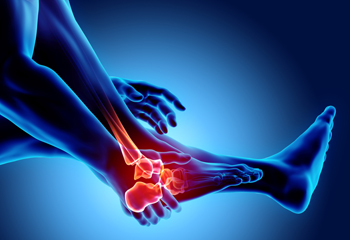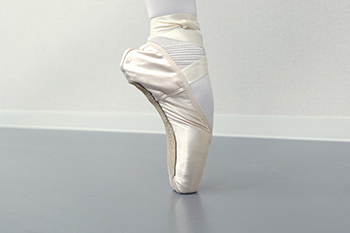Items filtered by date: August 2023
Wounds That Don't Heal Need to Be Checked
Managing Foot Arthritis

Arthritis can affect the joints in the ankles, feet, and toes, leading to symptoms such as pain, swelling, and stiffness. It can also cause changes in the shape of the feet, making it challenging to find appropriate footwear. Some ways to manage foot arthritis include exercise to maintain joint mobility, weight management if necessary to help reduce pressure on the feet, and properly fitted and supportive footwear to protect the feet. There are various medical treatments available to manage arthritis-related foot pain and stiffness. These may include medications, heat and cold therapy, topical creams, and dietary supplements. If you have discomfort from foot arthritis, it is suggested that you make an appointment with a podiatrist for an examination and treatment options to help you get back to comfortable functioning as soon as possible.
Arthritis can be a difficult condition to live with. If you are seeking treatment, contact Jon McCreary, DPM from Fort Worth Podiatry. Our doctor can provide the care you need to keep you pain-free and on your feet.
Arthritic Foot Care
Arthritis is a joint disorder that involves the inflammation of different joints in your body, such as those in your feet. Arthritis is often caused by a degenerative joint disease and causes mild to severe pain in all affected areas. In addition to this, swelling and stiffness in the affected joints can also be a common symptom of arthritis.
In many cases, wearing ill-fitting shoes can worsen the effects and pain of arthritis. Wearing shoes that have a lower heel and extra room can help your feet feel more comfortable. In cases of rheumatoid arthritis, the arch in your foot may become problematic. Buying shoes with proper arch support that contour to your feet can help immensely.
Alleviating Arthritic Pain
- Exercises that stretch the foot can prevent further pain and injury and increase mobility
- Most of the pain can be alleviated with anti-inflammatory drugs, heat, and topical medications
- Massages can help temporarily alleviate pain.
It is best to see your doctor for the treatment that is right for your needs and symptoms. Conditions vary, and a podiatrist can help you determine the right method of care for your feet.
If you have any questions, please feel free to contact our office located in Fort Worth, TX . We offer the newest diagnostic tools and technology to treat your foot and ankle needs.
Unveiling Causes and Treatment Options for Foot Pain

Foot pain, a common and often underestimated concern, can happen for different reasons, each demanding attention for effective relief. Overuse and strain can result from prolonged standing or excessive physical activity, leading to discomfort and inflammation. Ill fitting footwear is also a common reason to have foot pain, and wearing shoes that are unsupportive can stress the feet's delicate structures. Conditions such as plantar fasciitis, characterized by heel pain, stem from inflammation of the foot's thick tissue band. Arthritis can also trigger foot pain as a result of joint inflammation. Addressing foot pain requires appropriate measures to be taken, including rest, gentle stretches, and the use of orthotic insoles. In more severe cases, medical consultation from a podiatrist may be essential for diagnosis and personalized treatment. If you have foot pain, it is strongly suggested that you are under the care of a podiatrist who can effectively determine what the cause is, and offer correct treatment methods.
Foot Pain
Foot pain can be extremely painful and debilitating. If you have a foot pain, consult with Jon McCreary, DPM from Fort Worth Podiatry. Our doctor will assess your condition and provide you with quality foot and ankle treatment.
Causes
Foot pain is a very broad condition that could be caused by one or more ailments. The most common include:
- Bunions
- Hammertoes
- Plantar Fasciitis
- Bone Spurs
- Corns
- Tarsal Tunnel Syndrome
- Ingrown Toenails
- Arthritis (such as Gout, Rheumatoid, and Osteoarthritis)
- Flat Feet
- Injury (from stress fractures, broken toe, foot, ankle, Achilles tendon ruptures, and sprains)
- And more
Diagnosis
To figure out the cause of foot pain, podiatrists utilize several different methods. This can range from simple visual inspections and sensation tests to X-rays and MRI scans. Prior medical history, family medical history, and any recent physical traumatic events will all be taken into consideration for a proper diagnosis.
Treatment
Treatment depends upon the cause of the foot pain. Whether it is resting, staying off the foot, or having surgery; podiatrists have a number of treatment options available for foot pain.
If you have any questions, please feel free to contact our office located in Fort Worth, TX . We offer the newest diagnostic and treatment technologies for all your foot care needs.
Pros and Cons of Ballet Dancers' Feet

Ballet dancers are applauded for their graceful movements and poise, but behind the scenes lies the reality of the toll their ability takes on their feet. The pros of ballet dancer's feet are apparent in their strength, flexibility, and dexterity, allowing them to execute intricate routines with finesse. The intense training helps develop well defined arches and toned muscles. However, the cons cannot be ignored. Constant strain on the feet can lead to painful conditions such as bunions, stress fractures, and plantar fasciitis. The pressure to maintain a certain appearance may result in dancers pushing through injuries, possibly leading to chronic foot issues. Additionally, the repetitive movements can cause wear and tear on the joints, leading to long term problems. While the beauty of ballet is undeniable, it is essential to acknowledge the physical demands it places on dancers' feet and prioritize their foot health through proper care and attention. It is suggested that ballet dancers include a podiatrist on their medical team who can effectively treat any foot problems that may arise.
If you have any concerns about your feet, contact Jon McCreary, DPM from Fort Worth Podiatry. Our doctor can provide the care you need to keep you pain-free and on your feet.
Biomechanics in Podiatry
Podiatric biomechanics is a particular sector of specialty podiatry with licensed practitioners who are trained to diagnose and treat conditions affecting the foot, ankle and lower leg. Biomechanics deals with the forces that act against the body, causing an interference with the biological structures. It focuses on the movement of the ankle, the foot and the forces that interact with them.
A History of Biomechanics
- Biomechanics dates back to the BC era in Egypt where evidence of professional foot care has been recorded.
- In 1974, biomechanics gained a higher profile from the studies of Merton Root, who claimed that by changing or controlling the forces between the ankle and the foot, corrections or conditions could be implemented to gain strength and coordination in the area.
Modern technological improvements are based on past theories and therapeutic processes that provide a better understanding of podiatric concepts for biomechanics. Computers can provide accurate information about the forces and patterns of the feet and lower legs.
Understanding biomechanics of the feet can help improve and eliminate pain, stopping further stress to the foot.
If you have any questions please feel free to contact our office located in Fort Worth, TX . We offer the newest diagnostic and treatment technologies for all your foot and ankle needs.
The Importance of Choosing the Right Shoes for Children

As parents, we cherish every moment of our children's growth and development. When it comes to their footwear, making the right choices is crucial. Shoes play a significant role in supporting their feet as they explore the world around them. There are essential tips to look for while buying children’s shoes. Having a proper fit can ensure there is adequate room for growth. Wearing shoes that are soft and flexible can encourage natural foot movement. Having ample arch support can help to aid in proper foot development. Additionally, choosing shoes that are made of breathable materials like mesh or leather can help to keep the feet dry and comfortable. Children's feet grow rapidly, and having regular checkups can help to ensure the right fit. By prioritizing the health and comfort of our children's feet, we empower them to enjoy every step of their journey toward a bright and active future. It is suggested that you speak with a podiatrist who can provide you with additional information about shoes for children.
Making sure that your children maintain good foot health is very important as they grow. If you have any questions, contact Jon McCreary, DPM of Fort Worth Podiatry. Our doctor can provide the care you need to keep you pain-free and on your feet.
Keeping Children's Feet Healthy
Having healthy feet during childhood can help prevent medical problems later in life, namely in the back and legs. As children grow, their feet require different types of care. Here are some things to consider...
Although babies do not walk yet, it is still very important to take care of their feet.
Avoid putting tight shoes or socks on his or her feet.
Allow the baby to stretch and kick his or her feet to feel comfortable.
As a toddler, kids are now on the move and begin to develop differently. At this age, toddlers are getting a feel for walking, so don’t be alarmed if your toddler is unsteady or ‘walks funny’.
As your child gets older, it is important to teach them how to take care of their feet.
Show them proper hygiene to prevent infections such as fungus.
Be watchful for any pain or injury.
Have all injuries checked by a doctor as soon as possible.
Comfortable, protective shoes should always be worn, especially at play.
If you have any questions please feel free to contact our office located in Fort Worth, TX . We offer the newest diagnostic and treatment technologies for all your foot and ankle needs.
What Has Caused My Ingrown Toenail?

Toenails grow over the skin, and an ingrown toenail occurs when the nail grows into the skin instead of over it. This can be an extremely painful foot condition, and may be caused by genetic reasons, or from wearing shoes that are too tight. It may also happen if a toe injury has occurred, such as stubbing the foot against a piece of furniture. Research has indicated that having poor posture may lead to developing an ingrown toenail. This may cause the toes to push together, and pressure can be exerted on them as they grow. Additionally, a common reason to have an ingrown toenail can be from cutting the toenails incorrectly, or from having poor foot hygiene. If you have an ingrown toenail, it is strongly suggested that you are under the care of a podiatrist who can correct this painful condition, which may include surgery for permanent relief.
Ingrown toenails may initially present themselves as a minor discomfort, but they may progress into an infection in the skin without proper treatment. For more information about ingrown toenails, contact Jon McCreary, DPM of Fort Worth Podiatry. Our doctor can provide the care you need to keep you pain-free and on your feet.
Ingrown Toenails
Ingrown toenails are caused when the corner or side of a toenail grows into the soft flesh surrounding it. They often result in redness, swelling, pain, and in some cases, infection. This condition typically affects the big toe and may recur if it is not treated properly.
Causes
- Improper toenail trimming
- Genetics
- Improper shoe fitting
- Injury from pedicures or nail picking
- Abnormal gait
- Poor hygiene
You are more likely to develop an ingrown toenail if you are obese, have diabetes, arthritis, or have any fungal infection in your nails. Additionally, people who have foot or toe deformities are at a higher risk of developing an ingrown toenail.
Symptoms
Some symptoms of ingrown toenails are redness, swelling, and pain. In rare cases, there may be a yellowish drainage coming from the nail.
Treatment
Ignoring an ingrown toenail can have serious complications. Infections of the nail border can progress to a deeper soft-tissue infection, which can then turn into a bone infection. You should always speak with your podiatrist if you suspect you have an ingrown toenail, especially if you have diabetes or poor circulation.
If you have any questions, please feel free to contact our office located in Fort Worth, TX . We offer the newest diagnostic and treatment technologies for all your foot care needs.

